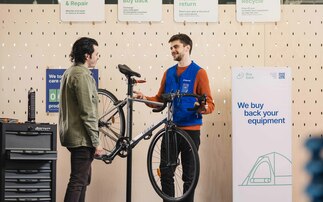From cutting food waste to ending hunger, Tetra Pak is getting excited about some big-picture sustainable thinking
Mustan Lalani gets asked a lot about recycling. This isn't that surprising in itself - as the head of environmental affairs for Tetra Pak, one of the world's best-known packaging suppliers, recycling is a big part of his day-to-day role.
But, he argues, recycling is just part of his job and while it a big component if Tetra-Pak's environment efforts it should be seen as a basic business activity to build on, not the limit of a company's sustainability ambitions. "When we talk about sustainability we too often go right into recycling," he tells BusinessGreen on the sidelines of the BusinessGreen Leaders' Summit earlier this month. "What are we doing about recycling? Our perspective is that this is absolutely important, and it's our licence to operate and we are doing what we have to do there, but I am more interested in saying 'can we solve that problem already please?' Let's get on to the interesting stuff."
"This is hygiene," he concludes. "Recycling is hygiene."
That's not to say Tetra Pak has been doing nothing on recycling over the last few years - Lalani reels off a host of programmes and initiatives designed to boost recycling rates of its packaging around the world, from working closely with EU lawmakers on the Circular Economy package to supporting - both financially and logistically - a host of collection systems around the world that are working to maximise the collection and reuse of packets and cartons. And in parts of the world where mature recycling infrastructure does not exist, Lalani says Tetra Pak has been "doing it on our own" without government support, working with more than 160 recyclers to fund new equipment or provide them with technical or operational support to get recycling rates moving in those markets.
This has all helped the company boost its average global recycling rate from 20 per cent to 25 per cent in just seven years. But it hasn't so far been enough to deliver on the firm's original target of doubling the recycling rate of its beverage cartons to 40 per cent by 2020 - for that Lalani argues it needs more support from governments and the wider waste and materials sector. "In the absence of legislation and in the absence of this mature waste infrastructure that we have here in London for example, you can't go very far," he explains. "We've gone as far as I think we have been able to go, but in order for us to go further that's when we need the formal waste management systems."
There's a sense then, that although Tetra Pak is committed to continuing to push for a level playing field in the recycling sector to ensure as much as what can be recycled is, the company is ready to broaden the conversation to encompass some of the bigger-picture sustainability trends where it believes it can also make a difference.
And after a busy year, there's certainly a lot to talk about. Not only did Tetra Pak launch its suite of Science-Based Targets (SBTs) in February - including an ambitious emissions goal of a 42 per cent reduction by 2030 - it has also launched a new bioplastic film using cane sugar and revealed it now sources a third of its power from renewables, putting it well on target to hit its RE100 target of 100 per cent renewable power by 2030.
All these moves are underpinned by Tetra Pak's commitment to play its part in delivering on the Paris Agreement and the Sustainable Development Goals (SDGs), explains Lalani.
Alongside the SDGs on responsible production, tackling climate change and boosting clean energy, Tetra Pak believes it can have a meaningful impact on ending hunger, boosting nutrition and tackling food waste. "We see our role as a player in the food value chain, to link the food sources with the hungry mouths," he says.
For example, food stored in Tetra Pak's cartons do not need preservatives or specialist storage facilities - its cartoned UHT milk stays fresh for up to six months without refrigeration. With up to 40 per cent of the food produced in the developing world going to waste - including £4.4bn worth of food in India alone - solving the problem of getting nutritious produce from farm to fork before it spoils is a crucial humanitarian and climate challenge.
Meanwhile, a growing part of Tetra Pak's business is in food processing, an area where big gains in public health can be made. "Historically we are a packaging company, but our food filling lines are an increasing part of our business," explains Lalani. "We are not only now only offering the packages, but what we are trying to do now is to help customers development the equipment or systems needed to get food into a processed state so that they can sell it." The aim is to help Tetra Pak's customers develop the most nutritious product, from soups to juices, and get them into the hands of those that need it most, he says.
"We have in many countries an obesity problem, and in other countries we have a hunger problem," he explains. In both cases, this boils down to a nutrition problem. "That's why the products that we have been working on with our customers are nutritious products," he says. "For us that's really the more exciting part about where sustainability lies."
It all adds up to an impressive roster of programmes that cover a host of environmental and social issues, often in the same breath. Of course, Tetra Pak will always be a key player in the recycling debate, but it's certainly got ambitions to define sustainability way beyond our waste streams. Who can blame Lalani for being excited about that?
Tetra Pak was a sponsor of the BusinessGreen Leaders' Summit









